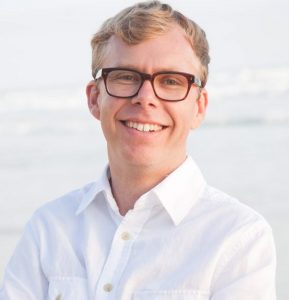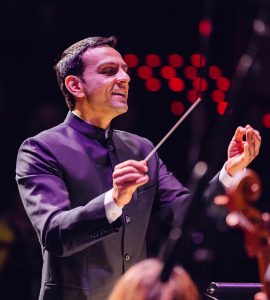Sacra/Profana’s Concert of American Choral Music with a Literary Bent

Juan Carlos Acosta [photo courtesy of Sacra/Profana]
Living up to the high expectations of those who follow choral music in San Diego, Sacra/Profana’s clean, well-disciplined ensemble and warm, ingratiating sonority rewarded the respectably sized audience in the Lutheran sanctuary. Artistic Director Juan Carlos Acosta and Founding Director Krishan Oberoi alternated on the podium, leading the 20 voices of Sacra/Profana with firm, yet understated precision.
I was most impressed with Dominick Argento’s I Hate and I Love, a

Krishan Oberoi [photo courtesy of the performer]
In the 1950s and 60s, composer William Schuman was an important player in American classical music circles. Among his various roles, he was president of New York CIty’s prestigious Juilliard School of Music. But in more recent decades, his once heralded symphonies have disappeared from orchestral programs. His short choral cycle Carols of Death, based on poems by Walt Whitman, display his urbane, modernist style: sleek, dark progressions that unexpectedly flare into vivid emotional display only to quickly recede into mystery. The last movement of his cycle “To All, to Each,” opened with Whitman’s line “Come lovely and soothing death,” and was set in stately chorale style. It immediately called to mind J. S. Bach’s moving chorale on the text “Komm, süsser Todt.”
When the name Alice Parker appears on a program of choral music, it usually graces a winning arrangement of traditional folk music or a spiritual. She spent 20 years arranging choral music for the eminent conductor Robert Shaw, and her technical skills are nonpareil. But as I heard Sacra/Profana perform Parker’s own recent cycle Heavenly Hurt, based on seven poems by Emily Dickinson, I could not conclude that she was the composer to supply music to the poetry of the complex, ironic New England poet.
The title Heavenly Hurt comes from the first Dickinson poem in Parker’s set, and it embraces a duality, an irony that pervades the poet’s outlook. Parker’s lilting, sunny melodies and unadventurous harmonic vocabulary hardly did justice to Dickinson’s poetry, although the women of Sacra/Profana lavished their glowing sonority and impeccable phrasing on Parker’s perfumed score. Contemporary composers such as Ricky Ian Gordon and Jake Heggie have admirably set Dickinson’s poetry with aptly unpredictable themes and a bold harmonic complexity that unlock her insights. They sailed right by Parker.
Earl Kim spent most of his composing career on the music faculty of Harvard, but his works have never been widely performed. So it was worthwhile to hear Sacra/Profana unearth his Some Thoughts on Keats and Coleridge, five short movements that comment on famous shards of poetry by those literary giants. I found the texts wry and occasionally amusing, but Kim’s slow declamatory style and harmonic timidity made a good case for keeping these academic scores on the library shelves.
Sacra/Profana opened with Charles Ives’ magnificent gem “Serenity,” a mystical chant on another Whitman text that hovers over two mildly dissonant, rocking chords played very quietly on the piano. Written in 1919, it is clear that Ives “invented” minimalism years before Steve Reich was even born. The chorus sang divided into two equal groups along the side aisles of the church nave, allowing Ives’ dulcet strains to float like clouds of incense over the audience.
Sacra/Profana presented this concert at Christ Lutheran Church in San Diego’s Pacific Beach neighborhood on Friday, October 18, 2019.

Ken Herman, a classically trained pianist and organist, has covered music for the San Diego Union, the Los Angeles Times’ San Diego Edition, and for sandiego.com. He has won numerous awards, including first place for Live Performance and Opera Reviews in the 2017, the 2018, and the 2019 Excellence in Journalism Awards competition held by the San Diego Press Club. A Chicago native, he came to San Diego to pursue a graduate degree and stayed.Read more…
